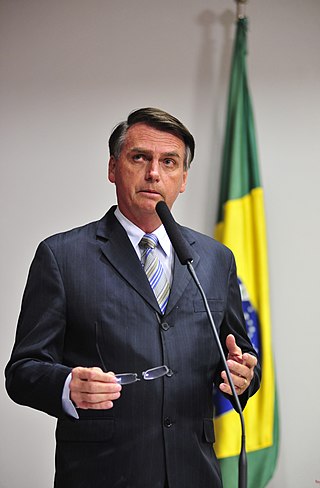Related Research Articles
The Strategic National Stockpile (SNS), originally called the National Pharmaceutical Stockpile (NPS), is the United States' national repository of antibiotics, vaccines, chemical antidotes, antitoxins, and other critical medical supplies. Its website states:
"The Strategic National Stockpile's role is to supplement state and local supplies during public health emergencies. Many states have products stockpiled, as well. The supplies, medicines, and devices for life-saving care contained in the stockpile can be used as a short-term stopgap buffer when the immediate supply of adequate amounts of these materials may not be immediately available."

Alex Michael Azar II is an American attorney, businessman, lobbyist, and former pharmaceutical executive who served as the United States secretary of health and human services from 2018 to 2021. Azar was nominated to his post by President Donald Trump on November 13, 2017, and confirmed by the United States Senate on January 24, 2018. He was also chairman of the White House Coronavirus Task Force from its inception in January 2020 to February 2020, when he was replaced by Vice President Mike Pence.

The Biomedical Advanced Research and Development Authority(BARDA) is a U.S. Department of Health and Human Services (HHS) office responsible for the procurement and development of medical countermeasures, principally against bioterrorism, including chemical, biological, radiological and nuclear (CBRN) threats, as well as pandemic influenza and emerging diseases. BARDA was established in 2006 through the Pandemic and All-Hazards Preparedness Act (PAHPA) and reports to the Office of the Assistant Secretary for Preparedness and Response (ASPR). The office manages Project BioShield, which funds the research, development and stockpiling of vaccines and treatments that the government could use during public health emergencies such as chemical, biological, radiological or nuclear (CBRN) attacks.

The foreign policy of Xi Jinping concerns the policies of the People's Republic of China's Xi Jinping with respect to other nations. Xi succeeded as the General Secretary of the Chinese Communist Party and became the paramount leader in 2012. Xi has reportedly taken a hard-line on security issues as well as foreign affairs, projecting a more nationalistic and assertive China on the world stage. His political program calls for a China more united and confident of its own value system and political structure. Xi Jinping's "Major Country Diplomacy" doctrine has replaced the earlier Deng Xiaoping era slogan of "keep a low profile" and has legitimized a more active role for China on the world stage, particularly with regards to reform of the international order, engaging in open ideological competition with the West, and assuming a greater responsibility for global affairs in accordance with China's rising power and status.

The COVID-19 pandemic in Taiwan is part of the worldwide pandemic of coronavirus disease 2019 caused by severe acute respiratory syndrome coronavirus 2. As of 19 March 2023 in Taiwan, 10,231,343 are confirmed cases, including 18,775 deaths.

The COVID-19 pandemic in Cambodia is part of the ongoing worldwide pandemic of coronavirus disease 2019 caused by severe acute respiratory syndrome coronavirus 2. The first imported case in Cambodia was detected in Sihanoukville on 27 January 2020. Although a number of imported cases and transmission to direct contacts were confirmed throughout 2020, no community transmission was detected until 29 November 2020. As of July 2021, Phnom Penh has been the most affected province with the majority of infections and deaths. Banteay Meanchey has the second-highest number of infections, whereas Kandal has second-highest number of deaths.

The COVID-19 pandemic in Cuba is part of the worldwide pandemic of coronavirus disease 2019 caused by severe acute respiratory syndrome coronavirus 2. The virus was confirmed to have spread to Cuba on 11 March 2020 when three Italian tourists tested positive for the virus.

The COVID-19 pandemic in Trinidad and Tobago is part of the ongoing global viral pandemic of coronavirus disease 2019 (COVID-19), which was confirmed to have reached the Republic of Trinidad and Tobago on 12 March 2020.

The World Health Organization (WHO) is a leading organisation involved in the global coordination for mitigating the COVID-19 pandemic within the broader United Nations response to the pandemic.
Planning and preparing for pandemics has happened in countries and international organizations. The World Health Organization writes recommendations and guidelines, though there is no sustained mechanism to review countries' preparedness for epidemics and their rapid response abilities. National action depends on national governments. In 2005–2006, before the 2009 swine flu pandemic and during the decade following it, the governments in the United States, France, UK, and others managed strategic health equipment stocks, but they often reduced stocks after the 2009 pandemic in order to reduce costs.

The COVID-19 pandemic has affected international relations and caused diplomatic tensions, as well as resulted in a United Nations Security Council resolution demanding a global ceasefire.
Science diplomacy is the collaborative efforts by local and global entities to solve global issues using science and technology as a base. In science diplomacy, collaboration takes place to advance science but science can also be used to facilitate diplomatic relations. This allows even conflicting nations to come together through science to find solutions to global issues. Global organizations, researchers, public health officials, countries, government officials, and clinicians have previously worked together to create effective measures of infection control and subsequent treatment. They continue to do so through sharing of resources, research data, ideas, and by putting into effect laws and regulations that can further advance scientific research. Without the collaborative efforts of such entities, the world would not have the vaccines and treatments we now possess for diseases that were once considered deadly such as tuberculosis, tetanus, polio, influenza, etc. Historically, science diplomacy has proved successful in diseases such as SARS, Ebola, Zika and continues to be relevant during the COVID-19 pandemic today.

Due to its severity, the COVID-19 pandemic has caused countries to send aid, as part of the international responses and management regarding the pandemic. Types of materials aided includes masks, medical supplies, personal protective equipment, money, and test kits. It started with aid to China as the virus spreads primarily there, and then internationally as it spreads globally. The destination of the aid ranges from hospitals, COVID-19 healthcare workers, research on the vaccine, to societies vulnerable. People donating includes the government of said country, notable people, organizations and institutions, charities, as well as regular people.

Vaccine diplomacy, a form of medical diplomacy, is the use of vaccines to improve a country's diplomatic relationship and influence of other countries. Meanwhile, vaccine diplomacy also "means a set of diplomatic measures taken to ensure access to the best practices in the development of potential vaccines, to enhance bilateral and/or multilateral cooperation between countries in conducting joint R&D, and, in the case of the announcement of production, to ensure the signing of a contract for the purchase of the vaccine at the shortest term." Although primary discussed in the context of the supply of COVID-19 vaccines, it also played a part in the distribution of the smallpox vaccine.

During the worldwide COVID-19 pandemic, many people began to spread false or un-confirmed data and information. This included politicians and other government officials from administrations in several countries. Misinformation about the virus includes its origin, how it spreads, and methods of preventing and curing the disease. Some downplayed the threat of the pandemic, and made false statements about preventative measures, death rates and testing within their own countries. Some have also spread COVID-19 vaccine misinformation. Changing policies also created confusion and contributed to the spread of misinformation. For example, the World Health Organization (WHO) originally discouraged use of face masks by the general public in early 2020, advising "If you are healthy, you only need to wear a mask if you are taking care of a person with suspected 2019-nCoV infection," although the WHO later changed their advice to encourage public wearing of face masks.

The United States' response to the COVID-19 pandemic with consists of various measures by the medical community; the federal, state, and local governments; the military; and the private sector. The public response has been highly polarized, with partisan divides being observed and a number of concurrent protests and unrest complicating the response.
Respirator diplomacy of Taiwan refers to the exchange of masks between Taiwan and other countries, aimed to help the Global Coronavirus Response.

Zero-COVID, also known as COVID-Zero and "Find, Test, Trace, Isolate, and Support" (FTTIS), is a public health policy that has been implemented by some countries, especially China, during the COVID-19 pandemic. In contrast to the living with COVID-19 strategy, the zero-COVID strategy is one "of control and maximum suppression". It involves using public health measures such as contact tracing, mass testing, border quarantine, lockdowns, and mitigation software in order to stop community transmission of COVID-19 as soon as it is detected. The goal of the strategy is to get the area back to zero new infections and resume normal economic and social activities.

The COVID-19 pandemic in China is part of the worldwide pandemic of coronavirus disease 2019 (COVID-19) caused by severe acute respiratory syndrome coronavirus 2 (SARS-CoV-2). China was the first country to experience an outbreak of the disease, the first to impose drastic measures in response, and one of the first countries to bring the outbreak under control.
Taiwan-Slovakia relations refers to bilateral ties between Taiwan and Slovakia.
References
- 1 2 Volodzko, David. "China's Medical Diplomacy". thediplomat.com. The Diplomat. Retrieved 1 April 2020.
- ↑ "medical diplomacy | USC Center on Public Diplomacy". uscpublicdiplomacy.org. Retrieved 2021-03-11.
- ↑ Tseng, Esther. "The Power of Friendship, Taiwan's Public Health Diplomacy". www.taiwan-panorama.com. Taiwan Panorama. Retrieved 1 April 2020.
- 1 2 Jack, Andrew. "Cuba's medical diplomacy". www.ft.com. Financial Times. Retrieved 1 April 2020.
- ↑ Horton, Chris; Li, Lauly; Ting-Fang, Cheng. "Taiwan counters China's isolation campaign with mask diplomacy". asia.nikkei.com. Nikkei. Retrieved 23 April 2020.
- ↑ Nikolova, Antoinette (8 May 2020). "Russian COVID-19 aid to Italy: PR stunt or covert operation?". www.euractiv.com. Retrieved 16 September 2020.
- 1 2 3 Korolev, Alexander S. (2023). "Political and Economic Security in Multipolar Eurasia". China and Eurasian Powers in a Multipolar World Order 2.0: Security, Diplomacy, Economy and Cyberspace. Mher Sahakyan. New York: Routledge. ISBN 978-1-003-35258-7. OCLC 1353290533.
- ↑ Wiebel, Haley. "Cuban Medical Diplomacy: A Developmental Paradox". www.coha.org. Council on Hemispheric Affairs. Retrieved 1 April 2020.
- ↑ Groll, Elias. "Cuba's greatest export? Medical diplomacy". foreignpolicy.com. Foreign Policy. Retrieved 1 April 2020.
- 1 2 3 4 5 Zhao, Suisheng (2023). The dragon roars back : transformational leaders and dynamics of Chinese foreign policy. Stanford, California: Stanford University Press. p. 90. ISBN 978-1-5036-3088-8. OCLC 1331741429.
- ↑ Hui Yan, Ho. "Taiwan Spreads Diplomatic Wings Through Regional Health Care". www.asiasentinel.com. Asia Sentinel. Retrieved 1 April 2020.
- ↑ Sung, Wen-Ti (2 June 2020). "Taiwan's COVID-19 Diplomacy and WHO Participation: Losing the Battle But Winning the War?". thediplomat.com. Retrieved 16 September 2020.
- ↑ "Global Health Diplomacy". www.hhs.gov. HHS. 23 March 2016. Retrieved 1 April 2020.
- ↑ and Saadoun al-Dulaimi, Aizen J. Marrogi. "Medical Diplomacy in Achieving U.S. Global Strategic Objectives". ndupress.ndu.edu. National Defense University Press. Retrieved 1 April 2020.